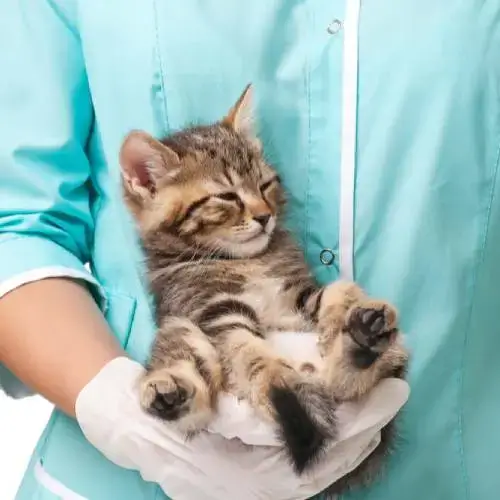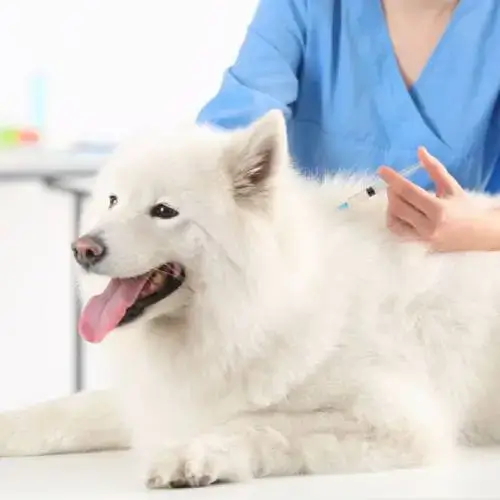Home / Compare Pet Insurance / Dog and cat vaccinations

Key takeaways
- There are two categories of pet vaccinations − core and non-core vaccines.
- Puppies and kittens need vaccinations in their first few weeks of life, followed by boosters.
- Initial kitten and puppy vaccinations can cost between $170 to $250, while annual vaccinations can cost roughly $80-$90.
- Optional routine care can help cover vaccination costs and other preventative treatments.
Expert tips on keeping on top of pet vaccinations
Our resident pet insurance expert, Adrian Taylor, has helpful tips for staying on top of your cat or dog vaccinations.

Get a tailored vaccine program
Get a vaccination schedule for your pet to keep up to date with all their vaccines and annual boosters. Your vet will conduct a health check-up and assess your furry friend’s needs to recommend a program. Many pet owners believe their dog or cat is protected for life once they’ve had their initial round of vaccinations, but that’s not the case. Pets need boosters to maintain their immunity to infectious diseases.
Always go to a qualified veterinarian
Vaccinations can cause pets stress and discomfort, so make sure only a qualified veterinarian or vet nurse administers the vaccine. They should know how to use desensitising techniques to make the process more comfortable for your fur baby and yourself.
Consider routine care cover
You can get a routine care add-on to your pet insurance to help pay for periodic check-ups, vaccinations, and other preventative care procedures. This comes at an added premium, but you may opt to pay a higher excess at claims time to reduce the cost of your policy.
Core and non-core pet vaccinations
Dog and cat vaccinations are classified into core and non-core immunisations. Core vaccines are deemed essential to protect your pet against deadly or debilitating diseases. Core vaccinations should be administered from six or eight weeks of age, typically followed by a booster vaccine every two to four weeks until they reach 16 weeks.1
Non-core vaccines may be prescribed if your dog or cat is susceptible to illnesses or diseases due to their breed, location, environment or lifestyle.
Cat vaccinations
What vaccinations do cats and kittens need?

Cats may require yearly F3 booster vaccinations to provide a long-term immune response and other vaccination boosters every one to three years, depending on the risk of disease exposure.
The most commonly known kitten and cat vaccinations include:
- F3 vaccine. This vaccination combination covers the ‘big three’ cat diseases: cat flu or Feline Panleukopenia (also called Feline parvovirus or Feline Infectious Enteritis), Feline Rhinotracheitis Virus and Feline Calicivirus.
- FIV vaccine. A non-core vaccination, the FIV vaccine protects against Feline Immunodeficiency Virus.
- FeLV. This non-core vaccination protects against Feline Leukaemia Virus.2
In addition, you may be able to vaccinate your cat against other ailments, including rabies, Chlamydia Felis and Bordetella Bronchiseptica.2 Pet owners should be aware of other common cat diseases.
How much do cat vaccinations cost?
Annual vaccinations for adult cats and vet check-ups can cost about $80, depending on the type of vaccination needed and the vet.3 You may pay up to a couple of hundred dollars for cat vaccination costs when getting multiple vaccinations at once, or within a short period. Contact your local vet to inquire about vaccination protocol, prices, and your cat’s needs.
How much do kitten vaccinations cost?
Initial vaccinations for kittens could cost between $170 to $200, according to the RSPCA.3 Veterinary costs will differ depending on your pet’s needs and the veterinary practice you visit. Initial vaccinations can be more expensive than a second vaccination or follow-up boosters. You can contact your vet to ask about vaccination costs for your cat.
Dog vaccinations
What vaccinations do dogs and puppies need?

Some typically prescribed puppy and dog vaccinations include:
- C3 vaccine. The core vaccine for canines, C3 covers deadly diseases such as Canine Distemper, Canine Parvovirus and Canine Adenovirus (also called Canine Hepatitis).
- KC. This non-core vaccine protects your pooch against canine cough, also known as kennel cough (Bordetella Bronchieseptica and Parainfluenza Virus).4
Along with these common preventative treatments, additional non-core dog vaccinations may be recommended by your vet, depending on your dog’s exposure risk. For example, the Leptospirosis vaccine may be recommended for dogs that regularly go outside, while small breed dogs and dogs that live in urban environments may not need this. Other common dog diseases may not have a vaccine but knowing about them is important.
How much do dog vaccinations cost?
Annual vaccinations for adult dogs and vet check-ups can cost about $90, depending on the vaccine required, which vet you visit and whether you’re after a batch of initial vaccinations or just a booster.3 It’s best to budget for a few hundred dollars to be safe.
How much do puppy vaccinations cost?
Initial puppy vaccinations could cost you $170 to $250, according to the RSPCA.3 Dog and puppy vaccination costs will vary depending on your pet’s healthcare needs and which vet administers the vaccinations. You can contact your vet to inquire how much vaccinating your puppy or dog could cost.
Important to know
Does pet insurance cover vaccinations for cats and dogs?

Pet insurance with a routine care add-on can cover a portion of pet vaccinations and other routine treatments such as de-sexing, microchipping, teeth cleaning and worming. Behavioural training may also be available through routine care cover. Routine care cover is an optional extra with comprehensive pet insurance. Claims for vaccination expenses will be subject to any policy excess and benefit percentage that applies to your policy.
Do cats and dogs need the same vaccinations?
Generally, cats and dogs don’t need the same vaccinations, as the diseases their core and non-core vaccines protect against are unique to their species.
However, cats and dogs can have similar symptoms to different ailments. This may include sneezing and coughing, difficulty breathing for respiratory diseases (e.g. Canine Distemper Virus or Feline Herpesvirus), loss of appetite and diarrhoea.
When can my puppy start socialising after getting vaccinated?
Most vets recommend keeping your puppy away from other dogs until they’re fully vaccinated (or have at least had their core vaccines). Allow a few weeks for the vaccinations to take effect and for your dog to build enough antibodies/immunity to ward off infections. This means the recommended time for taking your puppy to the dog park can vary, though it’s typically a couple of weeks after their final vaccination.
Should I still vaccinate my cat or dog if they don’t go outside?
The decision to vaccinate a pet is up to each individual pet owner, though veterinarians commonly recommend it to prevent serious and potentially deadly diseases. If you have an indoor cat or dog that doesn’t leave the house, they can still potentially get sick with a preventable disease if pathogens are carried into the indoor environment.
Why should my pet get vaccinated?
Vaccinations can protect your cat or dog from contracting life-threatening diseases and provide optimum ‘herd immunity’ to reduce the likelihood of outbreaks. Furthermore, some vaccine-preventable illnesses aren’t treatable with medications or covered by pet insurance.
Do I need to keep a pet vaccination record?
You should receive a pet health record when you visit the vet for the first time, and most vets will continue keeping records of their patients and vaccinations throughout their life. This may be an electronic record or a physical booklet.
When you adopt or buy a pet, particularly when it’s older, you should inquire from the breeder or adoption agency about what health records they have for the animal. Your pet’s medical and health information will be required when taking out pet insurance or going to an animal hospital.
Are pet vaccinations safe?
Pet vaccinations are considered safe and essential to keep your cat or dog healthy. There are sometimes short-term side effects or mild discomfort from injections and low incidences of adverse reactions like injection site sarcoma in cats. Still, the benefits of vaccinations to protect your pet from severe or even fatal diseases significantly outweigh the risk of side effects.
Meet our pet insurance expert, Adrian Taylor
As a General Insurance expert with over 13 years’ experience in financial services, Adrian Taylor knows that dogs and cats get themselves into all sorts of mischief. One part of Adrian’s work is to help empower consumers to understand how pet insurance can help save them from exorbitant vet bills when their pet gets injured or falls ill.
Want to know more about pet insurance?
1 RSPCA − All you need to know about pet vaccinations. Accessed May 2023.
2 RSPCA − What vaccinations should my cat receive? Accessed May 2023.
3 RSPCA New South Wales – Costs. Accessed May 2023.
4 RSPCA − What vaccinations should my dog receive? Accessed May 2023


